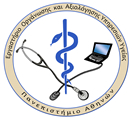Symptoms
|
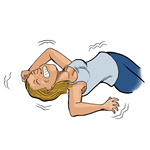 1. Spasm of the jaw muscles 1. Spasm of the jaw muscles
|
|
|
|
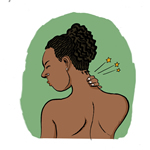 2. Stiffness of the neck muscles 2. Stiffness of the neck muscles
|
|
|
|
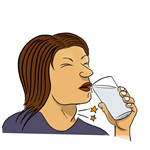 3. Difficulty swallowing 3. Difficulty swallowing
|
|
|
|
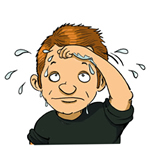 4. Stiffness of the abdominal muscles 4. Stiffness of the abdominal muscles
|
|
|
|
 5. Fever 5. Fever
|
|
|
|
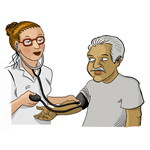 6. Sweating 6. Sweating
|
|
|
|
 7. Elevated blood pressure 7. Elevated blood pressure
|
|
|
|
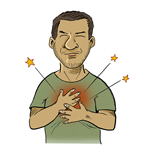 8. Tachycardia 8. Tachycardia
|
|
|
|
 9. Convulsions (rarely) 9. Convulsions (rarely)
|
Tetanus is a potentially fatal disease.
Transmission
-
Spores of the tetanus bacteria may be introduced through any wound or severe burn causing a break in the skin. Deep, large and open wounds are of greater concern.
-
Tetanus bacteria are present in the soil as well as in the intestinal system and the manure of many animals and the feces of humans. Contamination of a wound with soil, manure and fertilizer is the most dangerous scenario.
-
You can also get tetanus through contact with fragments, through bites and tattoos.
-
Individuals using intravenous drugs are at increased risk of infection with tetanus.
Tetanus is not transmitted from person to person.
Treatment
For the treatment of the disease, seek emergency medical assistance. The treatment depends on the tetanus vaccines that the patient has had. In any case, the wound should initially be disinfected. A patient of unknown immunization history, or who is not fully covered by the vaccine, bearing a wound that is potentially infected with tetanus bacteria, should be administered one dose of the vaccine tetanus-diphtheria as well as a dose of another medicine (tetanus immune g-globulin) the earliest possible. There is no therapy for tetanus. The best «therapy» is prevention through vaccination.
Prevention
The best way to prevent tetanus is vaccination.
When to seek medical advice
If you have suffered a wound that may be infected with the bacteria of tetanus, seek medical help the soonest possible, having with you – if available – your immunization record, in particular if the wound is large and clearly infected.
Vaccines
All individuals should be vaccinated with the vaccine against tetanus – diphtheria (Td or Tdap). Booster doses should be given throughout life, every ten years.
References
keelpno
nhs
















